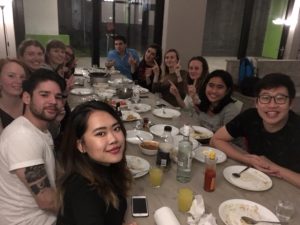Thesis Life: Finishing Touch
After more than half a year dealing with my thesis, finally, I got to get it finished. It was one of the most relieving moments in my life like I have made one more milestone. Reading hundreds of journals, doing experiments with trials and errors, and writing report overnight on Christmas holidays were paid off.
I will share with you things to do after experiments/data collection. These are based on my own experience in doing a thesis at HAP department.
1. Go to thesis ring and get your report reviewed by fellow colleagues
It was an advantage for me to have “Thesis ring” for my thesis report. For those who are not familiar with this term, “thesis ring” is a short discussion where your colleagues in the department you are in will review your report. You just have to send them your copy and they will help you with your report. Usually, they will review your grammar, diction, and syntax. It is very useful because it will not only improve your English grammar skills but also academic writing skills. A Ph.D. student or other thesis supervisor will moderate the discussion and give useful inputs in addition to the inputs from other participants.
It is not an obligation to come to thesis ring, nevertheless, they strongly advise you to come. I always attended thesis ring because besides getting help, I also would like to help others. It is a good kind of symbiosis mutualism, in my opinion. Even though we seem like trying to look for mistakes from others, we never took it personally because we know that it is for the best of the report 🙂 For me personally, it made me appreciate my friends’ reports more and I learned a lot from them.
2. Follow the academic writing guide
Usually, your supervisor will provide you with a guide on how to write an academic report. It is quite different with conversation language we use every day. I personally still have to struggle when it comes to academic writing. A writing guide will always help you to understand more about an academic report. Or, if you want to go an extra mile to enhance your writing skills, you can go to academic writing class. WUR provides academic writing course (with a special price for students) which you can follow.
3. Print your report
Make sure to check all your writings before you print the report. Because once you hand it in, there is no way back! You should print it at least three copies. One for you, one for your first supervisor, and one for your second supervisor. Do not forget to keep the soft-file version with you for further usage (or just to remind you of your hard work). You also have to send the soft-file to your department for their archive.
4. Prepare for your colloquium and oral examination
Colloquium! It is one of the most haunting words in the thesis period. but don’t worry to much, colloquium only takes 5% of your overall final grade. however, it is still very important to ace it. Students have to prepare a good and eye-catching PowerPoint presentation, in addition to a fruitful discussion. When choosing the words you’ll use for discussion, do not put too many words yet not too little that it’s not informative. You will do your colloquium in front of all staff and students of your department. If you’re lucky, the Professor / Chair of the department will come as well. Preparing for possible questions is always needed. Besides, it will also be useful for oral examination.
For me, the real challenge is an oral examination. There will be three people grading your oral exam, first supervisor, second supervisor, and the examiner. It is important to have an in-depth knowledge of the whole research because they will ask you fundamental questions about your thesis. If you are not a native English speaker, you don’t need to worry. They are very understanding and will help you to get your points across. Be confident, prepared, and focused on this examination and you will make it.
I hope my tips are insightful for you and I wish you the best for your thesis. Let me know how it goes in the comments so that we can share our once-in-a-lifetime experience to WUR students! 🙂




